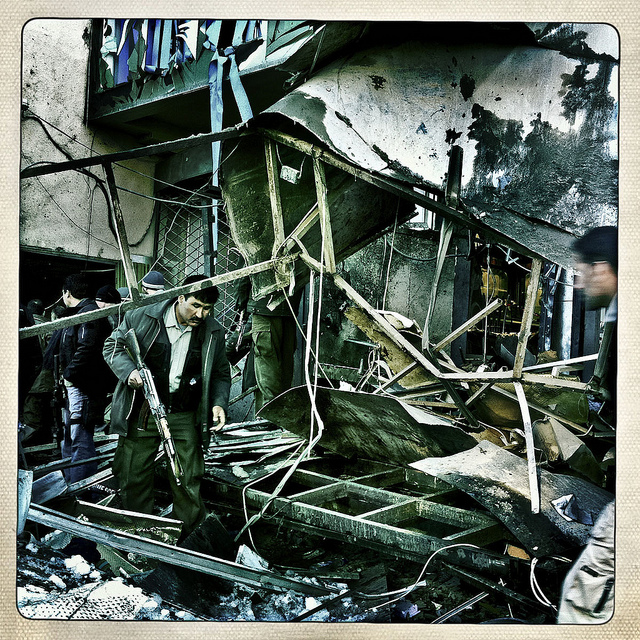"Bombings burst hopes for Pakistan peace talks"
February 6th, 2014Another round of bombings in Pakistan underlines the need for peace talks, writes Shumaila Shahani, 20, a Correspondent from Karachi in Pakistan, but may also have shattered hopes for the success of those talks.
Another attack comes in the way of peace.
Last week Pakistan Prime Minister Mr. Nawaz Sharif announced that his government wants to give peace one more chance despite a recent spate of attacks. He made a team of four and told the media that he would personally supervise the performance of the team. The announcement came a week ago; the same day Taliban militants targeted paramilitary soldiers, killing at least three Rangers personnel in separate bomb attacks in Karachi.
Today we get to witness another suicide attack in Peshawar, killing seven and injuring 42. Tehreek-e-Taliban Pakistan’s spokesperson said that they were not associated with the blast and termed the explosion an attempt to sabotage the ongoing peace talks. The Pakistan Tehreek-e-Insaf central information secretary Shireen Mazari separately called the blast an attempt to disrupt the process of peace. Sharif had also called on militants to observe a ceasefire in the televised speech.
Have we not given peace a chance before? Did we not try and talk to the Taliban before? Did we not try to tell the terrorists that they can’t be terrorists? For me it’s like telling a mentally ill person to behave when he should be sent to a psychiatric hospital.
Some may think I’m totally anti-peace, but let me explain myself here with the example of peace talks that we had in 2009. In an effort to achieve apparent peace the Awami National Party-led provincial government of the Khyber Pakhtunkhwa negotiated the release of Sufi Muhammad, the founder of TNSM and father-in-law of Fazlullah, once he had agreed to work towards a political solution. The outcome was that Taliban in the Swat District began to expand into the neighboring district of Buner after the peace deal was finalized. Muslim Khan of the TTP declared that the group would not lay down its arms until full implementation of Sharia in the region had been achieved. After militants began to withdraw from Buner, violence erupted in the Lower Dir district that threatened to further unravel the peace accord. On April 27, 2009 Sufi Mohammad announced that he was pulling out of peace negotiations due to the military operation, which the Army referred to as a “retaliatory strike”.
According to the military, the strike was a response to the killings of a police officer and a local administrator and to Taliban expansion outside of Swat. Even though the peace deal did not end immediately, it soon ended in vain. The then Pakistani Ambassador to the United States justified the deal in this manner:
“President Zardari did something very smart. When he was with President Obama recently, he explained it. He actually told the American government that I’m going to do this deal to try and prove to those within Pakistan, and in Pakistan’s state apparatus, who think that these guys can be negotiated with — I will negotiate with them only to prove that you can’t negotiate with them, because they will break the deal, and as soon as they broke the deal, the army is back in, the fighting is going on, and you can see the results.”
But do we need to do this all over again, so that it costs us another operation Rah-e-rast and operation rah-e-nijat, other thousands of dead bodies flowing in the country, another number of IDPs and another call for aid? Do we not learn anything from the past?
There is skepticism about the chances of success for obvious reasons. The TTP has said in the past that it opposes democracy and wants Islamic Sharia law imposed throughout Pakistan. English-language daily the Nation predicted the “peace talks balloon will burst soon enough”.
photo credit: Basetrack via photopin cc
…………………………………………………………………………………………………………………
About me: I am a Pakistani national and a final year student of Law enrolled at University of London external Programs. I’m studying law but I want to be a writer too, as my favourite part of law is research work and writing.
Apart from reading and writing I am interested in English Classics and I love to watch Audrey Hepburn and Marilyn Monroe. This explains my command over the English language.
…………………………………………………………………………………………………………………
Opinions expressed in this article are those of the author and do not necessarily represent the views of the Commonwealth Youth Programme. Articles are published in a spirit of dialogue, respect and understanding. If you disagree, why not submit a response?
To learn more about becoming a Commonwealth Correspondent please visit: http://www.yourcommonwealth.org/submit-articles/commonwealthcorrespondents/
…………………………………………………………………………………………………………………





